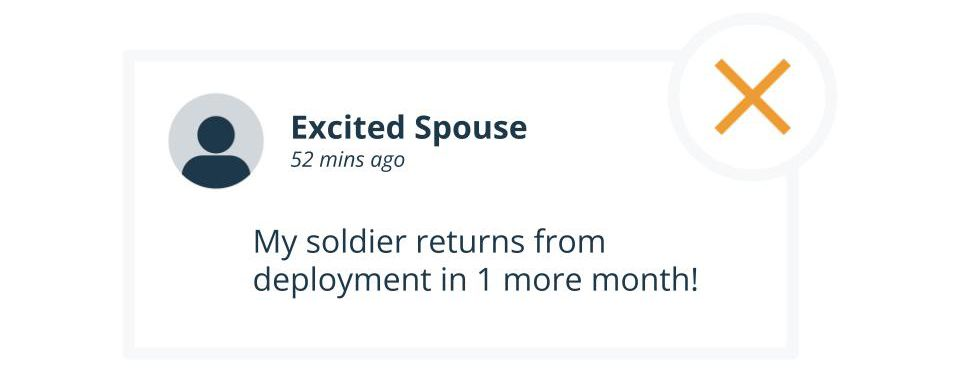Note: MOAA is a partner in the Cybercrime Support Network's Military and Veteran Program, which aims to protect servicemembers, veterans, and military families from falling victim to fraud. The below article from the Cybercrime Support Network's website is reprinted with permission.
Social media plays a huge role in military life. It helps us share experiences and stay connected to our friends, family and each other—whether we live across the country or the world. However, it’s important to be aware that what we share on social media can make us vulnerable to scams and attacks.

It can be very tempting to post about your service member’s homecoming, but it can put you and your family at risk both digitally and physically. Posts like the one above can give strangers and bad guys important information that they can use against you. Not only that, posts like these can also be copied and distributed anywhere on the web, even if your privacy settings are secure or you later delete the post. Anything you post on social media has the potential to live on forever, even if you try to get rid of it.
What Happens When You Overshare on Social Media?
From the perspective of scammers and hackers, social media is an easy way to gather information about potential targets in order to implement other types of scams and attacks, such as:
Hacked Accounts
A hacker gains unauthorized access to your social media accounts. They may use details you share on your profile to guess your password or send you targeted phishing messages to steal your login credentials. If you can’t log in, your accounts settings change, or strange messages are coming from your account, these are all signs that your account is compromised and you should take immediate action steps to secure your account.
Impersonation
Scammers create fake profiles using photos and information they collect from other accounts. The more information you share, the easier it is for scammers to create realistic personas that they use to scam other people. Oftentimes, these scammers impersonate senior officers or enlisted personnel and use their photos and information to carry out further scams—such as online shopping scams, advance fee scams or romance/friendship scams.
[RELATED: Protect Yourself From These 5 Common Fraud Schemes]
In addition, sharing too much information can put you at risk for further impersonation and identity theft. Displaying personal details like your birthday or maiden name may give bad guys the information they need to access other important accounts.
Romance/Friendship Scams
There are two ways romance or friendship scams affect the military community:
- Scammers use your photos and information on dating and social media sites to pose as military personnel. After they’ve established trust under the guise of someone else, they use emotional manipulation and love bombing in an attempt to steal money. Because your photos are being used, someone out there thinks they are talking to you, when they are really talking to someone who is taking advantage of them.
- Scammers use fake profiles to establish relationships with deployed service members with the same end game—to rob them. These scammers take advantage of the fact that these service members are lonely being separated from friends and family for months at a time. They will use information posted on their target’s social media pages to express common interests and establish trust. Once trust is established, they go in for the attack.
[MOAA'S 3-PART SERIES: Don't Be Scammed]
How Can Military Families Improve Their Security on Social Media?
- Think twice before you post. Don’t post details about deployment, unit activities, PCS, TDY or homecomings. This includes photos, dates, times and locations related to these events.
- Only accept friend requests from people you know.
- Review and maintain your security and privacy settings.
- Steer clear of social media quizzes. These may seem like innocent fun, but oftentimes the information you reveal in these quizzes can be used to answer security questions on other accounts.
- Never save your passwords to your browser. Instead use a password manager. There are many benefits of a password manager, one being that you can share your passwords amongst family members without compromising your accounts.
- Log out of all of your accounts when using a public or shared computer.
- If you have children who use social media, teach them how to stay safe and maintain privacy on social media.
Making a Difference in Military Life
Military spouse blogger Mrs. Navy Mama shares her support of MOAA’s efforts to help military families and how you can get involved.
